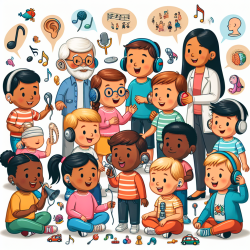Introduction
In the realm of speech-language pathology, understanding the broader socio-economic context can significantly enhance a practitioner's ability to tailor interventions and communicate effectively with diverse populations. A recent study titled "Social Mobility and Political Regimes: Intergenerational Mobility in Hungary, 1949–2017" offers profound insights into the dynamics of social mobility across different political regimes. This blog explores how these findings can inform and inspire practitioners in their quest to improve outcomes for children.
The Study's Key Findings
The study by Bukowski et al. (2021) meticulously analyzes social mobility in Hungary from 1949 to 2017, a period that encompasses two distinct political regimes: communism and free-market capitalism. Surprisingly, the research reveals that social mobility rates remained consistently low across both regimes, with an intergenerational status correlation of 0.6–0.8. This indicates a strong persistence of social status across generations, regardless of the political landscape.
Five key findings emerged from the study:
- Social mobility rates were low for both upper- and lower-class families throughout the period.
- The transition from communism to capitalism did not significantly alter social mobility rates.
- The Romani minority experienced even lower social mobility rates, with a divergence towards lower social status over time.
- Descendants of the eighteenth-century noble class retained significant privileges.
- Despite stable social mobility rates, the composition of the political elite changed rapidly with regime transitions.
Implications for Practitioners
For speech-language pathologists, these findings underscore the importance of considering socio-economic factors in therapeutic interventions. Here are some ways practitioners can leverage this research:
- Contextual Awareness: Recognize that socio-economic status can influence language development and access to resources. Tailor interventions to address these disparities.
- Cultural Competence: Be mindful of cultural and historical factors that may affect a child's communication style and learning environment.
- Advocacy: Use data-driven insights to advocate for policies that promote equitable access to speech-language services, especially for marginalized communities like the Romani.
- Research Engagement: Encourage further research into how socio-economic factors impact language development and therapy outcomes, particularly in diverse political and economic contexts.
Encouraging Further Research
The study highlights the need for continued research into the intricate relationship between socio-economic factors and language development. Practitioners are encouraged to collaborate with researchers to explore these dynamics further, ensuring that interventions are both evidence-based and culturally sensitive.
Conclusion
Understanding the socio-economic context in which children develop is crucial for speech-language pathologists aiming to create meaningful and lasting outcomes. The findings from the study on Hungary's social mobility offer valuable insights that can inform practice and inspire further research. By integrating these insights into their work, practitioners can better support children from diverse backgrounds in achieving their full potential.
To read the original research paper, please follow this link: Social Mobility and Political Regimes: Intergenerational Mobility in Hungary, 1949–2017.










